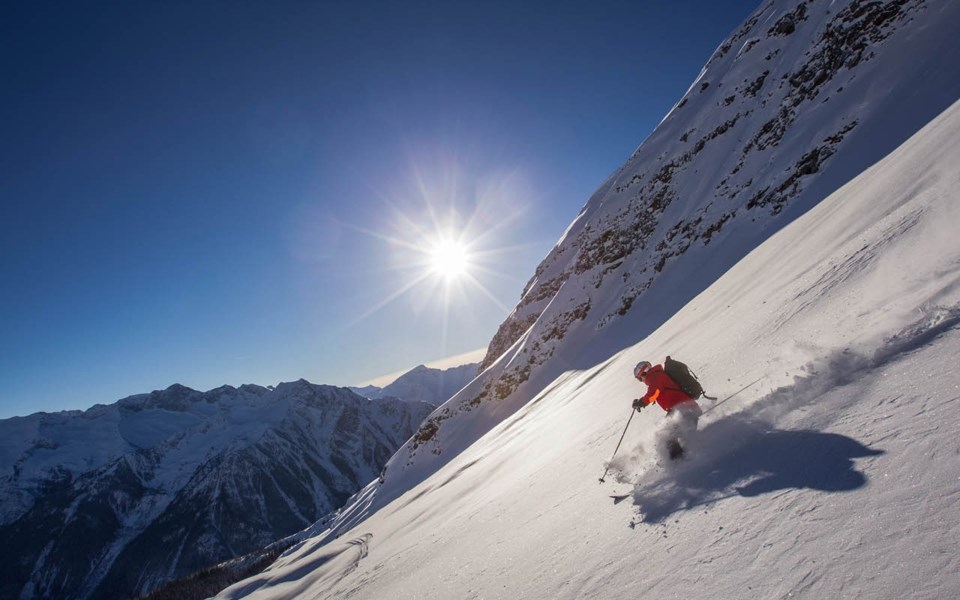Since its start in the 1970s, Mike Wiegele Helicopter Skiing has built its business around world-class powder skiing. Located in Blue River, B.C. — in the heart of the Cariboo and Monashee mountain ranges — thousands of well-heeled skiers have travelled to Wiegele's tenure, dropping tens of thousands of dollars to eat and ski like a king.
Snowmobiles — and snowmobile tracks — are a challenge to the company's operation. "It's like hitting railroad tracks," said Bob Sayer, lead guide and operations manager at Wiegele's in explaining how sleds impact the heli-skiers' runs.
"It jars your teeth when you hit one. They're deep and they freeze up hard."
Tensions between Wiegele's and local snowmobilers are currently red hot, as Wiegele's is seeking the ability to restrict public access to areas of eight mountains that surround Blue River. Snowmobilers are concerned, saying it represents a "privatization" of the backcountry. In a bid to pressure the province not to grant the tenure agreement, they've circulated an online petition — with over 20,000 signatures (mostly from snowmobilers).
The focus of their fight is centered on an area known as Duffy's, which boasts well-spaced trees — the kind of terrain that's both safe and totally fun to ride, for skiers and a snowmobilers alike.
The problem, from Wiegele's perspective, is that the company dropped some $800,000 to glade it — and now the area is "full of snowmobilers," said Sayer. Prior to the work, the forest was "too dense" to ski or snowmobile through, he explained, adding that more and more snowmobilers are using it despite being asked not to.
Having completed a successful resource-management plan with the province in the early 2000s, Wiegele's has designs and permission to carry out glading on sections of all eight of the mountains. But before they do, they want an assurance from the province that they will be able to force snowmobilers to keep out — so clients can avoid the "railroad tracks" that they cause.
"We're trying to create new runs, where they don't go and we don't go right now. But if we're going to spend the money to build them, then we want (snowmobilers) excluded," said Sayer.
"Is it privatizing it? Yes, I guess it is. But remember these aren't whole mountains, they're not huge areas: they're ski runs. What we're asking is we be given the right to keep snowmobilers off the runs we've invested in."
People shouldn't look at it as though Wiegele's is taking away terrain from snowmobilers, protested Sayer. The company, rather, is opening up new terrain that is currently too densely forested to use, for snowmobilers or skiers.
In terms of the investment in glading, Sayer said it makes sense from a business perspective: the terrain is stable, and accessible on bad weather days. And because it's located so close to Wiegele's base of operations, helicopters will be able to reach it quickly, cutting down on the astronomical costs of running a helicopter.
Having access to the terrain would allow the company to offer a more "cat-like experience," added Sayer, potentially allowing it to drop its prices, from $10,000 to $5,000 a week, if people were interested in just skiing the terrain.
But for Albert Venor, who leads the local snowmobiler organization, the Blue River Powder Packers Society, Wiegele's bid represents a greedy overreach from an operation that already has massive land tenure.
(According to Wiegle's own website, it offers access to "1.2 million acres of some of the most picturesque and breathtaking mountain terrain in the world.")
"They want to take more and more — when does this stop?" said Venor.
"We're tired of losing areas. It's kind of ridiculous when you look at the size of their tenures compared to the area we are able to snowmobile."
Venor said that snowmobilers have been forced into more dangerous areas because so much backcountry has been closed off to them.
"Some of the areas we've been forced to use have a lot of overhead exposure — from avalanche terrain, from cornices and terrain traps," he said.
Tensions, said Venor, are running high, though he remains open to striking a deal with the company.
"We don't want to vilify the heli-skiing company at all, we want the government to realize we have a major economic impact at well," he said.
For too long, the interests of snowmobilers have received short shrift from the province, and it's time for things to change, he said. "We've been playing defense as an industry for so long.
"We're tired of losing areas."




